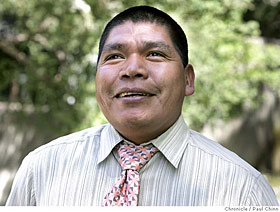 |
 |
 |
 Editorials | Environmental | April 2005 Editorials | Environmental | April 2005  
Environment Award for Mexican Indian
 Jane Kay - SF Chronicle Jane Kay - SF Chronicle


| | Isidro Baldenegro Lopez defied destructive logging in Chihuahua, Mexico. (Photo: Paul Chinn/Chronicle) |
Isidro Baldenegro Lopez was talking with his father when high-powered rifle shots cracked from the forest, killing his father, a Tarahumara Indian leader, two decades ago in a Sierra Madre mountain pueblo in Chihuahua, Mexico.

Baldenegro, then 19, knew the reason for the gunfire. His father had been leading protests against influential Mexicans taking an unfair share of money from the logging of collective lands also owned by the Tarahumara.

Baldenegro, now 39, took up the fight for land rights and forest protection for the Tarahumara, the largest indigenous population in northern Mexico. About 1,000 people live in his pueblo, Coloradas de la Virgen, and 80,000 more live in 60 pueblos in the state of Chihuahua. He battles on, he said Friday, because "of pride itself - and sometimes anger - and because of the injustices and the destruction of the forest."

Baldenegro, a subsistence farmer, is one of six grassroots activists representing five continents and one island receiving the coveted $125,000 Goldman Environmental Prize today in San Francisco.

The award committee searches for individuals they deem international environmental heroes, most overcoming hardships to combat destructive development and promote conservation of the natural environment.

The other winners are:

-- The Rev. Jose Andres Tamayo Cortez, 47, a Catholic priest from Olancho, Honduras, organized a coalition of small farmers into a movement of thousands marching on the capital to protest unregulated logging that threatens water supply and wildlife. Tamayo's social justice movement has inspired forestry reforms in rural communities.

-- Kaisha Atakhanova, 47, of Karaganda, Kazakhstan, a biologist who studies the genetic effects of radioactive materials, led a successful fight to keep the country from importing nuclear waste.

-- Corneille E.N. Ewango, 41, of Epulu, Congo, a botanist who valiantly protected rare animals and plants in the Okapi Faunal Reserve during a decade of civil war.

-- Stephanie Danielle Roth, 34, of Rosia Montana, Romania, the lead organizer against construction of Europe's largest open-cast gold mine in her country. Her campaign has led to the European Parliament's monitoring the proposed mine as a possible serious environmental threat.

-- Chavannes Jean-Baptiste, 58, of Papay, Haiti, founded the Peasant Movement of Papay three decades ago. Despite the volatile political climate, he has taught principles of sustainable agriculture and economic development to more than 200,000 people.

In giving the award to Baldenegro, the foundation noted that his homeland "is controlled informally by violent local crime bosses who gained power in the last 30 years by laundering drug money through logging and ranching operations. The government has been largely unresponsive to the violence."

Baldenegro is donating his prize money to the Sierra Madre Alliance, a U. S.-Mexican nonprofit that is creating a $400,000 fund to help the Tarahumara and the Tepehuan pursue land-rights claims for the descendants of the original members of the ejido, a land-owning collective. The alliance is also establishing community reserves and sustainable development projects.

Randall Gingrich, a watershed management specialist who founded and directs the Sierra Madre Alliance in Chihuahua, said his group documented the murder of 30 Tarahumara between 1986 and 1994, "some clearly done to repress community resistance to logging."

"Isidro really held the community together," Gingrich said. When other families fled violence and drought, "he stayed there, and became respected as a leader."

Shortly after Baldenegro led a blockade against illegal logging in 2003, he was arrested and jailed for 15 months on trumped-up charges before being exonerated, according to Amnesty International and the Sierra Club. He and Hermenegildo Rivas Carrillo have filed for compensation and charged the officials who arrested them. "There's been no response," Baldenegro said.

Historians say the Tarahumara left rich river valleys and took to the mountains and canyons when the Spaniards came searching for silver in the Sierra Madre. Over centuries, the Tarahumara have been pushed from good farmland. From December through March, they live in canyons. In April, they go into the mountains to raise crops and hope the food will last until the next harvest. Usually, the food runs out.

Their ancestral land encompasses ancient temperate forests descending to tropical forests in the Sinforosa Canyon, one of the rarest old-growth ponderosa pine habitats in Mexico. A USAID-World Wildlife Fund study determined that more than 99 percent of the Sierra

Richard Goldman and the late Rhoda Haas Goldman, a Levi Strauss family heiress, founded the Goldman Environmental Foundation, and in 1990 gave the first prize. | 
 | |
 |



